 Petzlover
Petzlover Chartreux is originated from France but Siamese/Tabby is originated from United Kingdom. Both Chartreux and Siamese/Tabby are having almost same weight. Chartreux may live 5 years less than Siamese/Tabby. Both Chartreux and Siamese/Tabby has same litter size. Chartreux requires Moderate Maintenance. But Siamese/Tabby requires Low Maintenance
Chartreux is originated from France but Siamese/Tabby is originated from United Kingdom. Both Chartreux and Siamese/Tabby are having almost same weight. Chartreux may live 5 years less than Siamese/Tabby. Both Chartreux and Siamese/Tabby has same litter size. Chartreux requires Moderate Maintenance. But Siamese/Tabby requires Low Maintenance
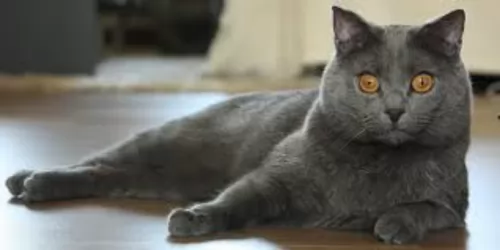 Hailing from France, the Chartreux cat is a rare cat breed but is still recognized by a number of cat registries around the world.
Hailing from France, the Chartreux cat is a rare cat breed but is still recognized by a number of cat registries around the world.
It’s not a new breed of cat, and in fact, the Chartreux is mentioned for the first time in 1558 in a poem and later on in paintings. There are quite a few legends as to the origins of the Chartreux and while some believe that the cats were brought to France by monks others believe that the Chartreux's ancestors were feral mountain cats from Syria.
European breeders kept the breed from extinction, especially after the 2nd world war, and the first Chartreux were brought to the United States in 1971. In 1987 the Cat Fancier’s Asociation advanced the Chartreux breed to championship status.
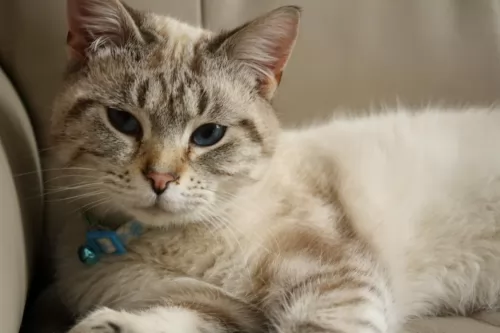 Lynx point Siamese cats are believed to also be known as Tabby point Siamese in the UK. Breeding of these cats began in about the 1940s and the first kitten born was crossed with a purebred Seal Point cat. That was the start of the seal tabby point Siamese cat.
Lynx point Siamese cats are believed to also be known as Tabby point Siamese in the UK. Breeding of these cats began in about the 1940s and the first kitten born was crossed with a purebred Seal Point cat. That was the start of the seal tabby point Siamese cat.
After the first kitten was born, many people were intrigued with it and it got plenty of attention, and breeders knew that to please cat lovers everywhere they would have to start producing these wonderful tabby Siamese points.
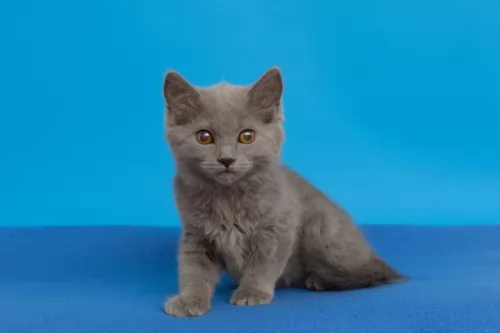 The Chartreux is a large, strong, stocky, muscular cat that can weigh anything between 4 to 7kg while some can weigh as much as 9kg.
The Chartreux is a large, strong, stocky, muscular cat that can weigh anything between 4 to 7kg while some can weigh as much as 9kg.
He has short legs when compared to the large body. He is known for his blue-like, silver-gray coat. In fact, the color can be any shade in the region of blue-grey. The coat is short, dense and double-coated and he has gold or copper-colored eyes.
People who have owned these cats say that they can take 3 to 4 years to reach maturity. Some people get mixed up and think this cat is very similar to the British Blue but they are two different breeds altogether.
The Chartreux is a real lap-cat just loving being able to settle down into his human owner's lap. It’s a cat with a 'smiling’ face because of the structure of his muzzle.
He is a very affectionate cat and will follow his people much like a dog. He is very intelligent and quiet and adapts well to a new situation. It's a cat that loves to climb so you will need to invest in a climbing tree for him as well as a scratching pole.
He is a good cat for first-time cat owners as well as being a good friend in homes with well brought up children. He is able to be friendly with other pets in the house.
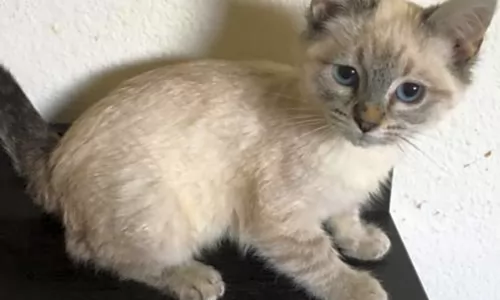 The Tabby pointed Siamese cat is medium-sized and can weigh between 3 and 5kg. He has some stripes, mostly around the legs, and the tail is also striped. These cats are available in many different colors – blue, lilac, apricot, seal, and chocolate. The ears are triangular-shaped and there is an ‘M’ shaped mark on the forehead of the cat. All these markings make the cat most distinctive.
The Tabby pointed Siamese cat is medium-sized and can weigh between 3 and 5kg. He has some stripes, mostly around the legs, and the tail is also striped. These cats are available in many different colors – blue, lilac, apricot, seal, and chocolate. The ears are triangular-shaped and there is an ‘M’ shaped mark on the forehead of the cat. All these markings make the cat most distinctive.
The Siamese and Siamese Tabby cats share many similarities in character. They are social cats, loving the interaction with their human families. They’re loyal, intelligent cats and they love to play.
They can live to be about 15 to 20 years of age and throughout this time they will provide you with love, companionship, entertainment, and joy.
In fact, they thrive so much on your company, that they can easily become lonely and run-down when left alone for too long.
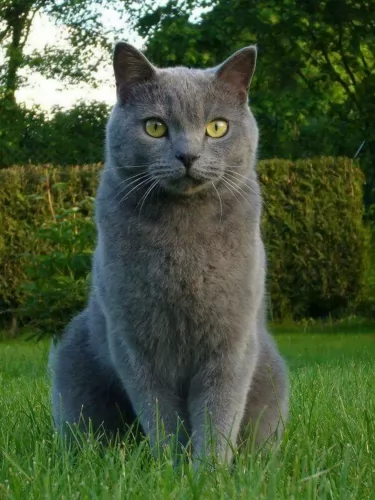 Although this is a large, strong cat, he is actually a gentle feline in nature and he doesn’t like being part of any bickering among his human family, preferring to run away. He also doesn’t like being spoken harshly to when he has done something wrong.
Although this is a large, strong cat, he is actually a gentle feline in nature and he doesn’t like being part of any bickering among his human family, preferring to run away. He also doesn’t like being spoken harshly to when he has done something wrong.
This cat isn’t an extrovert by any means but he isn’t particularly shy either and enjoys spending time with his human family.
He isn’t a demanding cat but is easy-going, just wanting to get on in life and he promises to make you a steady, loyal companion.
 These cats are people-loving cats – they just crave the companionship of their human family although they’re not particularly fond of strangers.
These cats are people-loving cats – they just crave the companionship of their human family although they’re not particularly fond of strangers.
They make wonderful pets as they actually want to be involved in everything that theur human owners are busy with. They truly are companionable.
They’re intelligent and playful and he will even love to go on a walk with you but then it is best to have him on a leash. Bring one of these awesome cats into your home and you’re guaranteed to have a friend for life.
 These cats are particularly prone to dental problems. The reason for this is that their incisors are closely set together and small.
These cats are particularly prone to dental problems. The reason for this is that their incisors are closely set together and small.
Because of the heaviness of this cat, the Chartreux is also prone to a disease known as patellar luxation or kneecap displacement. This problem can eventually lead to lameness. One way to avoid this particular problem is to rather get your kittens from reputable breeders.
These cats are much inclined towards weightiness so you have to be watching his diet carefully, more so because the cat is prone to patellar luxation.
 When you look at your cat, you want to see that his eyes are bright and clear, his fur is shiny, he is of a good weight and that he is energetic and content. Not looking like this could indicate health problems for your feline friend. He will need to get to the vet for his vaccines and the vet will check him over to so as to make sure he is in tip-top health.
When you look at your cat, you want to see that his eyes are bright and clear, his fur is shiny, he is of a good weight and that he is energetic and content. Not looking like this could indicate health problems for your feline friend. He will need to get to the vet for his vaccines and the vet will check him over to so as to make sure he is in tip-top health.
Make sure to check him over for parasites and these can cause diarrhea as can other issues such as bacteria, viruses, and the wrong food.
Frequent vomiting is also not normal as well as straining to urinate. These are all instances when you want to get your pet to the vet as soon as possible.
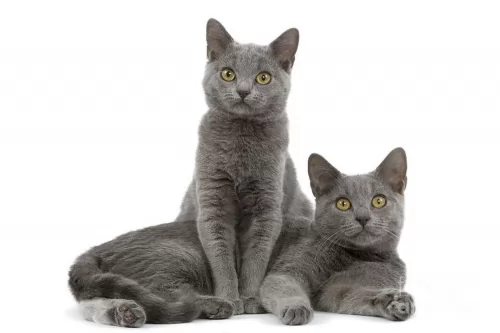 Your Chartreux cat’s dense, double coat will require brushing once or twice a week, especially in the cat’s seasonal shedding period.
Your Chartreux cat’s dense, double coat will require brushing once or twice a week, especially in the cat’s seasonal shedding period.
This cat doesn't take well to changes in his diet, particularly when he finds a type of food that he likes, then he wants to stick to that. You want to feed your cat a top-quality food to encourage good health but you want to avoid overfeeding as obesity in cats comes with lots of problems. A cat is a carnivore and you therefore need to feed your cat a diet rich in protein. Speak to your vet or another cat expert who can advise you on feeding your cat if you are in any kind of doubt. Make sure your kitty kat has a never-ending supply of fresh, cool water.
Always make a point of checking inside your cat's ears as well as inside his mouth for bad teeth. Bad teeth can cause terrible pain and your pet has no way of communicating this to you.
Have your cat neutered or spayed if you don't want your cat to have kittens.
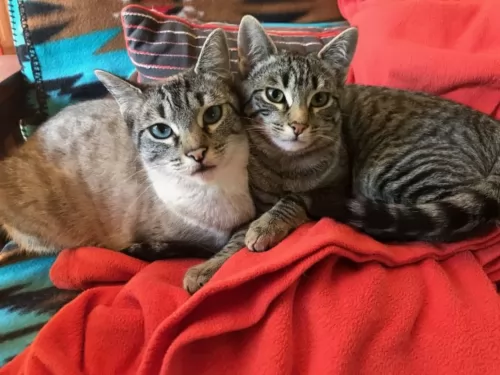 Before you commit to bringing a Siamese/Tabby into your home you must have everything ready for him.
Before you commit to bringing a Siamese/Tabby into your home you must have everything ready for him.
He will need food and water bowls, commercial cat food, grooming brush, a soft warm bed, collar and tag, litter box, a carrying container to get him to the vet safely, climbing tree, and scratching post.
The fine, silky coat doesn’t shed much and can easily be maintained with a weekly brush.
You will need to trim your cat’s paws. Trimming the claws can be difficult with a squirming cat and you can easily hurt him because of that. Rather get him to the vet who will do it for you.
Make sure to feed your Siamese/Tabby the very best cat food there is as poor quality food can contribute to poor health.
A cat is a carnivore and you therefore have to ensure that his food is made up essentially of meat. The commercial cat foods of today are formulated as dry, semi-moist, and canned and they offer a wonderfully convenient way for you to feed your cat. When you choose the best ones, they are palatable and digestible for your cat.
You just have to remember that your cat’s nutritional requirements change with his different stages of life. A kitten can’t possibly eat the same food as an adult cat. The nutritional claim on the cat food label will be a guide for you as to what your cat should be eating. Always ensure a constant supply of fresh, cool water.